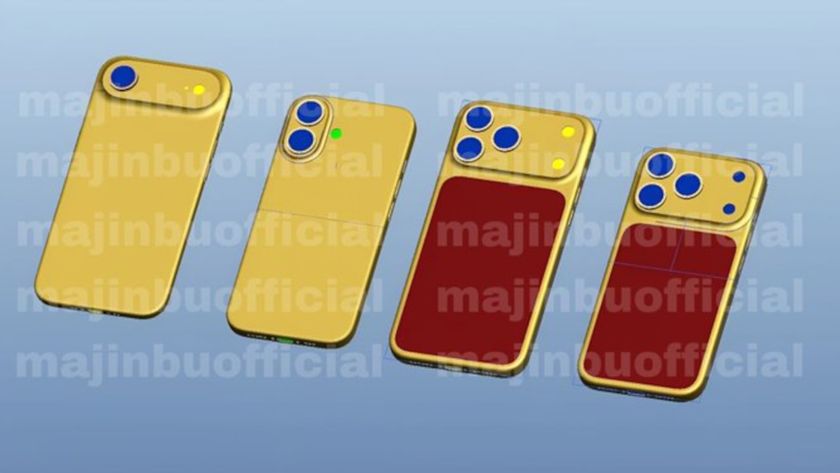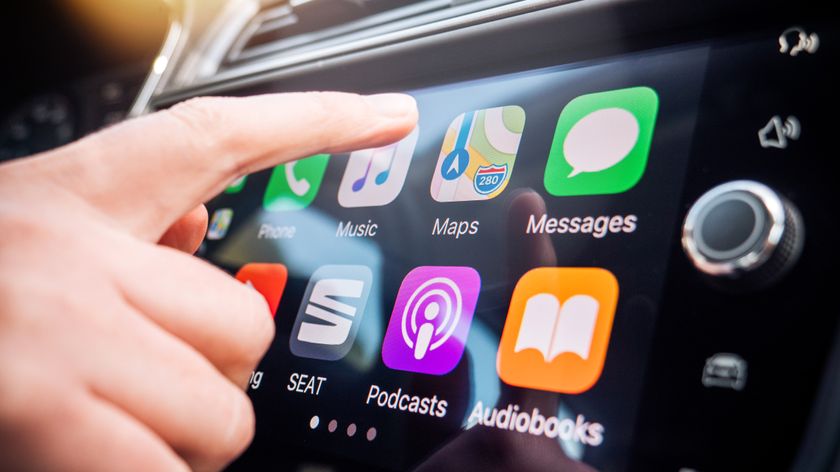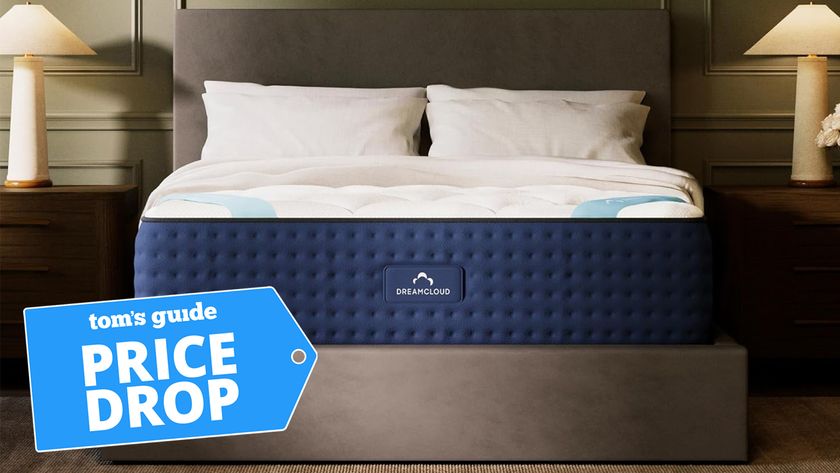iPhone 12 mini vs iPhone SE: Which small phone is best?
Our iPhone 12 mini vs iPhone SE face-off shows how much more you get for $300
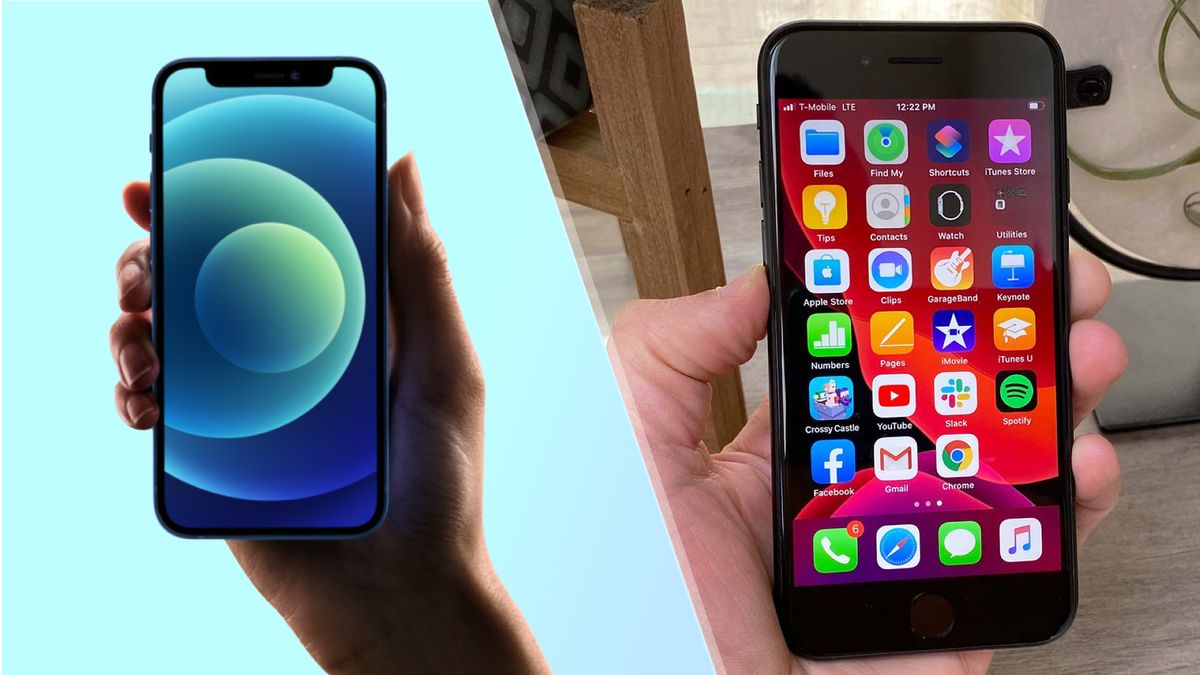
When the iPhone SE came out earlier this year, it may not have answered the hopes of those looking for a smaller iPhone, as its 4.7-inch screen and thick bezels were larger than the OG 4.0-inch iPhone SE. Enter the brand-new iPhone 12 mini, which packs a ton of upgrades, and puts everything in a smaller, lighter frame.
The iPhone SE, though, is still significantly lighter on your wallet, as one of the best cheap phones on the market. Can that low price stand up against the iPhone 12's more advanced hardware and modern design? To find out, we put together this iPhone 12 mini vs iPhone SE face-off.
- The best Black Friday deals are already out there
- The iPhone 12 mini will be a game changer — here’s why
- The best iPhone 12 mini cases
How much more bang for your buck do you get with the newer, smaller iPhone (which looks like it belongs on our best phones list)? Read on to find out.
iPhone 12 mini vs iPhone SE: Tech specs
| Header Cell - Column 0 | iPhone 12 mini | iPhone SE (2020) |
|---|---|---|
| Starting price | $699 on AT&T and Verizon, $729 elsewhere | $399 |
| Cellular connectivity | 5G | 4G LTE |
| Display | 5.4-inch Super Retina XDR | 4.7-inch Retina HD |
| Processor | A14 Bionic | A13 Bionic |
| Rear Camera(s) | 2x 12MP cameras (Ultra Wide ƒ/2.4, Wide: ƒ/1.6), Night Mode, 2x optical zoom, 5x digital zoom | 12MP camera (Wide ƒ/1.8), 5x digital zoom |
| Front camera | 12MP TrueDepth (ƒ/2.2), Smart HDR 3 photos, HDR/Dolby Vision for video | 7MP FaceTime HD (ƒ/2.2), Auto HDR photos |
| Security | Face ID | Touch ID |
| Storage | 64GB | 128GB | 256GB | 64GB | 128GB | 256GB |
| Dimensions | 5.2 x 2.5 x 0.3 inches | 5.5 x 2.7 x 0.3 inches |
| Weight | 4.8 ounces | 5.2 ounces |
| Battery life (Hrs:Mins) | Not yet tested | 9:18 (tested) |
| Charging | Lightning port, MagSafe, Qi | Lightning port, Qi |
iPhone 12 mini vs iPhone SE: Prices and release dates
The iPhone SE is still surprisingly cheap (for an iPhone), starting at $399. That model gives you 64GB of internal storage, and there are two higher capacity iPhone SE phones: the 128GB model costs $449 and the 256GB model costs $549.
The iPhone 12 mini is much more expensive (but still cheaper than bigger iPhone 12s), starting at $699. That price depends, though, on the carrier you're using. The iPhone 12 mini is $699 if you buy it on AT&T or Verizon, and its price goes up to $729 if you buy it unlocked, or from another carrier like T-Mobile.
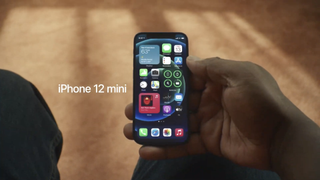
And just like the iPhone SE, you'll pay more for extra storage. The entry-level iPhone 12 mini comes with 64GB, and an upgrade to 128GB costs $150 extra, bringing you to $749/$779 and the 256GB version costs another $100, with a price of $849/$879.
You can get the iPhone SE right now, as it's been on sale since April. You'll need to wait a bit for the iPhone 12 mini, as it won't come out until Nov. 13.
Sign up to get the BEST of Tom's Guide direct to your inbox.
Get instant access to breaking news, the hottest reviews, great deals and helpful tips.
iPhone 12 mini vs iPhone SE: Design
The iPhone 12 mini and iPhone SE show the two different design languages that Apple's used over the last decade. The iPhone SE is the older version, with a home button and big top and bottom bezels, while the iPhone 12 mini has the signature iPhone notch and no home button. Both are made of the same aluminum that Apple rates as "aerospace-grade."
Plus, the iPhone 12 mini has flat sides (compared to the iPhone SE's curved edges) which I think looks better, as I've seen this style in the iPad Pro. Also, I bet the flatter sides will make the newer iPhone easier to hold.
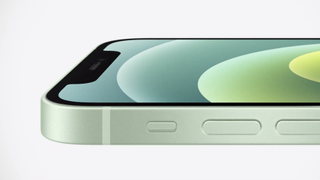
Ditching the bezels also enables the iPhone 12 mini to be more portable, while still offering a larger screen. That's right, the 5.4-inch iPhone 12 mini (5.2 x 2.5 x 0.3 inches, 4.8 ounces) is smaller and lighter than the 4.7-inch iPhone SE (5.5 x 2.7 x 0.3 inches, 5.2 ounces). That smaller size will also likely help the iPhone 12 mini fit in your palm better.
But learning what Apple's changed beyond that aesthetic look gives many a reason to pay the premium for the iPhone 12 mini. Tired of cracked screens? Apple's partnership with Corning (the folks behind Gorilla Glass) has led to the iPhone 12's new Ceramic Shield front, which the company claims gives you "4x better drop performance," vs. previous iPhones. That should translate to seriously improved durability. We anticipate plenty of iPhone 12 drop tests.
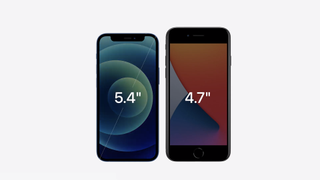
The iPhone 12's design also gives you improved water resistance, as it's able to survive deeper submersion. Apple rates it for surviving depths of up to 6 meters for 30 minutes, while the iPhone SE can only go 1 meter, for the same length of time.
While the iPhone SE and iPhone 12 mini are both available in black, white and Product (Red), the latter is also available in two new colors: a light green and a dark blue. Both look great on screen, but we've yet to see them in person.
iPhone 12 mini vs iPhone SE: Displays
If you can look past that notch, the iPhone 12 mini's 5.4-inch Super Retina XDR OLED display should win out here. For starters, the OLED technology and HDR visuals on the mini's screen give you rich picture quality — more vibrant colors, darker black tones and more — that the SE does not. The iPhone SE has an LCD panel, which might be good enough for many, provided they haven't seen an iPhone X or iPhone 11 display.
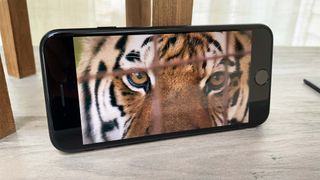
Plus, the iPhone 12 mini's 2340x1080-pixel resolution panel makes for a much sharper (476 ppi) screen. That's much more crisp than you'll get with the iPhone SE's 1334x750-pixel, 326 ppi panel. And, yes, the iPhone 12 mini's screen is Full HD to the iPhone SE's barely-HD panel.
The iPhone 12 mini screen also takes points on picture quality with a much higher contrast ratio (2,000,000:1 vs the iPhone SE's 1400:1), which will make for pictures and videos that look much more vibrant.
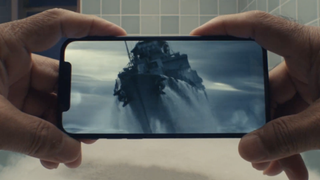
Apple rates the iPhone 12 mini for the same max brightness as the iPhone SE. While Apple claims both phones hit 625 nits, our tests showed the SE maxes out at an even higher 653 nits (which is really bright).
The iPhone SE produces 111.2% of the sRGB spectrum (again, great for its price), and we look forward to testing how colorful and bright the iPhone 12 mini gets.
iPhone 12 mini vs iPhone SE: Cameras
Again, the iPhone 12 mini handily beats the iPhone SE, and this time it's by a magnitude of 100% (at least on one side). While the iPhone SE has a single 12-megapixel wide-angle rear-facing camera sensor, the iPhone 12 mini packs two 12MP cameras: a wide-angle sensor along with an ultra-wide lens.
And before we break down all the perks of the iPhone 12 mini's cameras, let it be said that the iPhone SE has an excellent camera that creates shockingly good photos for its $399 price. The shots we took on the SE — including close-ups, portraits and shots of fish swimming — all looked pretty good. The only real flaw we found was that the iPhone SE lacks Night Mode.
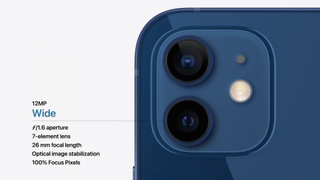
Simply comparing the wide-angle cameras on both iPhone models, the iPhone 12 mini wins, as it's got an aperture of ƒ/1.6, letting more light in (for better photos); the iPhone SE's sensor has an aperture of ƒ/1.8. Also, the iPhone 12 mini's wide-angle camera has a 7-element lens (vs the SE's 6-element lens), which should enable images and video with sharper detail, and improvements in low-light scenarios.
The iPhone 12 mini also offers 2x optical zoom, where the iPhone SE only gives you 5x digital zoom (which won't be as sharp).
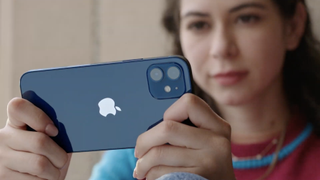
In terms of selfies, you'll also get sharper photos on the iPhone 12, which has a 12MP front camera that beats the 7MP sensor in the iPhone SE. Both, though, have Portrait mode, for photos with the bokeh effect that makes you look sharp while softening your backdrop.
Paying more also gets you Night Mode photography — for more illuminated photos in low-light settings — with the iPhone 12 mini (in all of its cameras). You can even take Night Mode time-lapse photos with the mini. The iPhone SE doesn't have a smidge of Night Mode.

The iPhone 12 mini provides the computational photography tricks that help Apple advance beyond camera tech. For example, Smart HDR 3 and machine learning help the iPhone 12 mini automatically adjust for extremely bright spots in photos, which Apple provided an example of, with a photo of a woman dancing in front of direct sunlight, where there was tons of detail, including the dirt path, and highlighted how clear her face was.
In other words, the iPhone 12 mini gives you sharp ultra-wide photography that the iPhone SE won't, optical zoom and Night Mode. Plus, it's got the smarts for simply better photos.
iPhone 12 mini vs iPhone SE: Face ID vs Touch ID
This one's a matter of your preference. The iPhone 12 mini has Face ID, which pretty quickly unlocks your phone when you simply look at it. But there are times when you'd probably wish it had the iPhone SE's Touch ID, such as when you're out and about wearing a face mask.
Apple's thankfully made it easier to jump to passcode unlock in those masked situations, but I still wish the iPhone 12 mini had Touch ID too.
iPhone 12 mini vs iPhone SE: Performance
The real-life differences between the iPhone 12 mini's A14 Bionic chip and the iPhone SE's A13 Bionic chip are going to be something we learn about as we test the new iPhone 12s out. For now, though, we can pretty easily see the newer iPhone will be faster.
Apple claims that the CPU and GPU performance will be 50% faster (presumably compared to the iPhone 11, which also ran on the A13 Bionic chip). These gains were made thanks to the A14 being the first smartphone processor built on the 5-nanometer process technology.
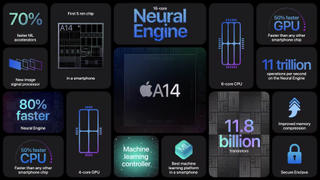
But that's all on paper. We'll test the iPhone 12 ourselves to find out it compares. The iPhone SE, for its price, offers amazing performance from that A13 chip, with a 3,226 on the Geekbench 5 benchmark, that was comparable to the more-pricey iPhone 11 and edged out the 3,147 from the Galaxy S20.
iPhone 12 mini vs iPhone SE: Battery life
The Tom's Guide battery test (continuous web-browsing over LTE) drained the iPhone SE in 9:18. That time is closer to Apple's streaming video estimate of up to 8 hours of battery than its 13-hour local video playback rating.
We look forward to running the iPhone 12 mini on the Tom's Guide battery test, to see how close it gets to Apple's claims (17 hours of local video, 11 hours of streaming video).
For what it's worth, the iPhone 11 — the last Apple phone to debut at the iPhone 12 mini's $699 price — lasted more than 11 hours on our battery test, placing it on the best phone battery life list. But the iPhone 11's battery is likely much larger than what Apple can fit into the iPhone 12 mini.
Both phones can charge wireless, though only the iPhone 12 mini supports new MagSafe wireless charging, a magnetic system that charges faster than many Qi-based wireless pads.
iPhone 12 mini vs iPhone SE: Outlook
It looks like the iPhone 12 mini is the better phone in every single way, minus its higher price. While the iPhone SE is not a bad phone, the iPhone 12 mini's got it beat in most key categories, with a display that supports high-end media standards, more cameras that offer smarter tricks and a new design that gives you more screen and puts less weight in your pocket.
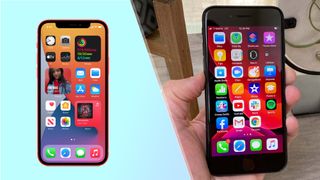
You can't be faulted for picking the iPhone SE, though, if you think "great" is good enough when "greater" costs 75% more. The iPhone SE's cameras and performance are both fantastic for its price, and give you a lot for less than Apple's ever priced an iPhone.
Of course, this is why we actually test phones, and not just take manufacturer's word on how good the latest gadgets are. Stay tuned to Tom's Guide for our full iPhone 12 mini review, so we can see how it stacks up with the rest of the palm-sized phones. If the iPhone 12 mini beats the SE on battery life by a significant margin, then this may be game over.

Henry is a managing editor at Tom’s Guide covering streaming media, laptops and all things Apple, reviewing devices and services for the past seven years. Prior to joining Tom's Guide, he reviewed software and hardware for TechRadar Pro, and interviewed artists for Patek Philippe International Magazine. He's also covered the wild world of professional wrestling for Cageside Seats, interviewing athletes and other industry veterans.
